While the precise workings of its new “traffic light system” are still being debated, the Central Finance Board of the Methodist Church plans to determine by the end of the year whether BP Plc, Royal Dutch Shell Plc, Total SA and Equinor ASA have the ethical credentials to merit continued investor support. Those preferences will be denoted by red, amber and green categories, which will reflect a firm’s efforts and commitment to reducing greenhouse gas emissions, its asset mix, capital expenditure, climate strategy and governance.
For the Methodists’ CFB, which manages more than 1.3 billion pounds ($1.7 billion), the direction of travel from an ethical standpoint will also be important as it also grades the largest mining companies. While the church stands by its 2015 decision to sell its holdings in Glencore Plc because of the Swiss miner’s high exposure to coal, it’s advocating a nuanced approach, said the CFB’s Chief Investment Officer Stephen Beer.
“The thing about divestment is it’s a one-shot tool,” Beer said in an interview. “You lose the ability to engage going forward.”
“You lose the ability to engage going forward.”
Since activist group 350.org started the climate divestment movement in 2012, institutional investors with $68.4 trillion under management have signed up to the six Principles for Responsible Investment, a United Nations-backed framework for incorporating environmental, social and governance issues into investment practices.

Coal has been the hardest hit with more than 850 institutions committing to quit investments in the dirtiest fuel. Norway’s $1 trillion sovereign wealth fund sold off most of its coal stocks, while many of the world’s biggest banks have refused to fund coal mines and power stations.
Methodism has long shunned investments in the alcohol and tobacco industries, but things aren’t so clear cut with climate change.
The church has said it will divest from companies that aren’t aligned with the Paris Agreement by 2020, but for Beer there’s “no hard cut-off.” While the Methodists are “stewards of God’s creation,” theoretically, resource companies can be aligned with Paris, he said.
“We have a guardianship role of the planet,” said Beer, adding that decisions to divest must be carefully weighed up. “We’re not trying to be holier than thou. We can’t just do it to feel good.”
(By Elizabeth Burden and Thomas Biesheuvel)





Comments